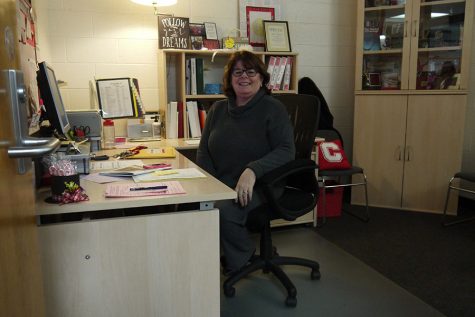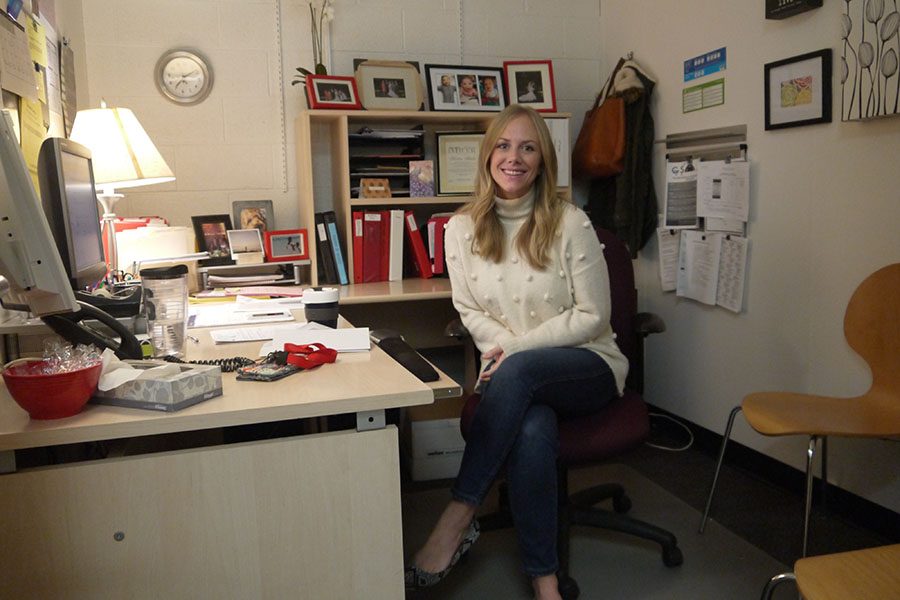Counselors at the Park
Kristen Shanks, Canton Counselor
“I guess you could say we’re the heartbeat, because we’re right in the middle of everything,” said Renee Eley, Salem counselor. For some students at the Park, the counselors’ office is just another doorway to rush past on the way to class, but in reality, the people inside those doors play a large role “right in the middle” of the most important aspects of high school.
Canton junior Nick Huang and Plymouth junior Josh Weber were just a few of many students who expressed the main issues they came to their counselor for: classes and scheduling. While choosing classes is a very important part of high school, counselors at the Park brought up the fact that they do much more. “Many people think that the primary role of a school counselor is to do scheduling, [but] it is really the least of my job,” said Christine Woods, Plymouth counselor. “I would say that students mostly come to me regarding personal issues. Many times because of the personal issues, students end up struggling with their academics. So, students might initially come to talk about how they are doing in a class and the discussion will move to personal concerns in their lives that are getting in the way of being successful in school.”
With each counselor handling more than 400 students, the counselors have to try their best to make sure they can interact with as many of those students as possible. In Plymouth, Woods has been reaching out and doing classroom lessons and presentations. She is also helping to run support groups like Grief Support Group and Stress Reduction Group, along with other Plymouth counselors like Nan Hansen, which gives students and counselors a chance to interact and talk when meeting with students individually isn’t possible. “I think what I love most [about my job] is running support groups,” said Hansen. “I love the power of a support group, and I love getting to know students.”
In Salem, the counselors try to get an individual communication going with the students. “For each grade level, we try to do a meeting with the students, so we try to meet every student at least once during the school year,” said Salem counselor Leah Babinski. “This year we [also] did a newsletter and we sent it to parents and all of the students on our caseload as well.”
Some students said it isn’t necessary for the counselors to try to get in touch with everyone. “I don’t think the counselors have to reach out to students,” said Jack Nugent, Salem junior. “I think that as long as students know they are there to help and that they shouldn’t be embarrassed to go to them, then the counselors are there for them.”
Canton senior Kelsey Postler thinks that it is more important for counselors to make sure they communicate with each student. “They could probably reach out a little more to the underclassmen and really stress that they can be there for you to talk to them about personal issues, too,” said Postler.
While speaking to the counselors can certainly make high school a much less daunting task, some students don’t need that support. “All the kids are different, so they all have different needs,” said Eley. “Some kids can navigate through high school just fine without ever seeing us.”
For those students who breeze through high school, the Plymouth-Canton Educational Park counselors are more than willing to make sure that they can tackle the obstacles that come after graduating. “I wish [students] would ask more about career and college,” said Barb Lehmann, Canton counselor. “I know they are overwhelmed and tend to look at short term goals and responsibilities [rather] than longer term plans.”

Barbara Lehmann, Canton Counselor
Hansen had a similar viewpoint, “I wish more students would come in and want to explore careers,” she said. “I think knowing or having an idea about what you want to do can help determine after high school plans better. Not everyone needs to go to two-year or four-year colleges.”
From personal issues, to academics, to post-graduation plans, high school counselors tackle it all. “Sometimes we’re called the catch-all office,” said Babinski. “If somebody doesn’t know where to go or what to do with something, they can come to the counseling office.”
Even if students don’t have any current issues they need to discuss, the counselors are always willing to find time to talk. “I really wish students would feel comfortable stopping in for a quick chat about how they’re doing,” said Plymouth counselor Jennifer Dealy. “I really wish students would stop in to say ‘Hi,’ grab a piece of candy and just check in with me.”
The counselors at the Park love interacting with students, and any one-on-one time is encouraged and appreciated, regardless of what topic students want to talk about.
Your donation will support the student journalists of Salem High School - MI. Your contribution will allow us to purchase equipment and cover our annual website hosting costs.
I'm a senior at Canton High School and this is my second year as a member of The Perspective. I really like reading, I run on the cross country and track...


